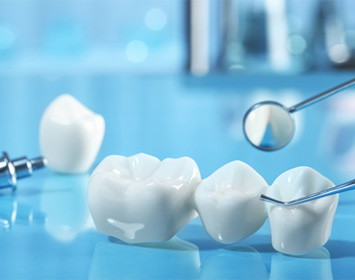Dentures New York
A Solution for All of Your Missing Teeth

When just one tooth or a few consecutive teeth are missing, the gap can be filled with a dental bridge. But when you’ve lost a great number of teeth, dentures are the best restorative option for rebuilding your smile. Today’s dentures are more reliable than ever, and you can count on Dr. Newman to give you a prosthesis that’s just right for your grin. Start the process of getting dentures in New York today by contacting our office and scheduling an appointment.
Why Choose Gramercy Dental Studio for Dentures?
- Practice That Places and Restores Dental Implants
- Fully Personalized Replacement Teeth
- Dentist Known for Skilled, Compassionate Care
Who’s a Good Candidate for Dentures?

Most healthy adults can qualify for dentures, whether they’ve lost one tooth or a great many. That said, you should still consult Dr. Newman before you commit to treatment. He’ll give you an oral exam and check if dentures would truly suit your smile’s needs. He can also suggest preliminary services to consider, as well as our other restorations. To learn more about being a denture candidate, please keep reading or call us.
Effects of Missing Teeth

It’s best to review tooth loss causes and effects as you consider dentures. Doing so lets you understand how treatment can benefit your whole smile.
People lose teeth for a wide range of reasons. For example, one person’s tooth could fall out if it decays or has a severe infection. Meanwhile, someone else may lose teeth due to gum disease – an issue that erodes the supportive gum tissue. The very unlucky can also have a tooth knocked out by n accident or injury.
On the other hand, tooth loss’ effects are limited but severe. A notable one is how the condition makes everyday tasks – eating, smiling, etc. – much tricker. Also, smile gaps will slowly erode your jaw if they aren’t filled quickly. They can also tilt your remaining teeth and breed harmful oral bacteria.
What Qualifies You for Dentures?

Most adults with missing teeth can qualify for dentures; treatment itself lacks strict requirements. However, you should still note three things.
For starters, dentures only work when your oral health is good. They can’t restore your full grin if your gums and jaw are too weak. Should that happen, your mouth won’t be strong enough to keep the prosthetic teeth in place. The only exceptions are minor oral issues; dentures can replace sensitive or decayed teeth.
You should also keep the number of lost teeth in mind. Depending on the final tally, it’ll affect what kind of denture you receive. Dr. Newman will likely suggest a partial one if you’ve only lost a few. In contrast, he’ll recommend a full denture if you must replace all teeth along an arch.
Lastly, don’t forget that finances play a big role in treatment. Dentures are the least costly tooth replacement option, even as they’re highly effective. That means they’re best suited for people with limited funds.
Alternative Tooth-Replacement Options

If Dr. Newman believes you don’t qualify for dentures, you don’t need to panic. Our practice will gladly walk you through our other restoration options. These include:
- Dental Bridges – A dental bridge is a fixed restoration made of two crowns fused to a pontic (i.e., an artificial tooth). As such, it relies on nearby teeth (i.e., abutments) to stay in place and “bridge” large smile gaps. A dentist must shave enamel from the abutments to place it.
- Dental Implants – Unlike dental bridges, dental implants are titanium posts placed in your jaw. Each one slowly fuses with your jawbone to become a permanent part of your mouth. This design makes them pricey, as their many benefits raise their cost.
Learn More About Dental Bridges
Learn More About Dental Implants
Types of Dentures

All of our dentures are made with your comfort and appearance in mind to ensure that you’re happy with the final prosthesis. We may suggest a partial denture, a full denture, or an implant denture; here’s what you need to know about each option.
Partial Dentures

Typically, a partial denture is used when only some of your teeth are missing. It will be designed to fit neatly into the gaps left by missing teeth. Partial dentures have acrylic bases supported by metal, and they use clasps to remain anchored to your mouth.
Full Dentures

You may need to get a full denture if an entire arch of teeth has been lost. The base of the dentures will be designed to match the color of your gums, and the prosthetic teeth will be made out of natural-looking materials. When you wear full dentures, suction helps ensure that they stay in place.
Implant Dentures

If you’re looking for a more modern form of tooth replacement, you may consider getting implant dentures. Dental implants will be inserted into your jaw to essentially act as artificial tooth roots for your prosthesis. You won’t have to worry about your new smile slipping out of place, and the results will both look and feel natural.
The Benefits of Dentures

If you’ve lost multiple teeth, daily tasks like eating, speaking, and smiling can become quite challenging. Thankfully, dentures can replace several, many, or a full row of missing teeth with beautifully lifelike restorations, providing patients with a range of life-changing benefits for their oral, overall, and psychological health. Here’s a brief guide to the many benefits dentures from Gramercy Dental Studio can provide to those who live with missing teeth.
Psychological Benefits

The loss of a few or many teeth can have a devastating effect on a person’s self-esteem, making it much more difficult for them to smile confidently or engage socially. People with extensive tooth loss are also more likely to experience sadness or depression. Replacing your lost teeth with dentures can vastly improve your confidence and self-esteem by easing anxieties about your appearance, speech, and ability to chew so you can participate more comfortably in social situations.
Clearer Enunciation

The teeth play a significant role in how the mouth forms words, and the loss of even a few of them can lead to significant speech difficulties. When the tongue cannot interact with the teeth properly during speech, some words can become exceedingly difficult to pronounce, which can make a person more hesitant to participate in conversations. Since dentures work just like your missing teeth when you speak, they can allow you to form words easily, clearly, and naturally after a brief adjustment period.
Improves Nutrition

Many healthy foods like raw fruits and veggies, fresh meat, and crunchy nuts are tough in texture, meaning that eating them requires significant chewing power. Unfortunately, tooth loss makes it difficult for many people to chew thoroughly or enjoy a diverse and balanced diet, resulting in health issues like indigestion or malnutrition. By improving your chewing ability, dentures can allow you to consume a wider range of nutritious foods, making it much easier to get all the sustenance your body needs to stay healthy and strong.
Preserves Oral Health

Tooth loss can lead to a variety of oral health issues such as the remaining teeth shifting out of alignment and the gums becoming more exposed to injury. Since dentures take the place of your missing teeth, they can prevent your remaining pearly whites from drifting out of their positions while protecting your gums from food debris. They can also redistribute the pressure of chewing more evenly to reduce the wear and tear endured by your natural teeth.
Expands Opportunities

Your smile plays a key role in making first impressions, and having a grin you can be proud of can be of considerable benefit when you’re looking for a job, making a sale, or in line for a promotion. In fact, one 2019 study found that people with good oral health are more likely to be employed. Restoring your beautiful smile with dentures may open a wealth of social and professional opportunities.
Understanding the Cost of Dentures

If you look into dentures, you’ll want to know their price before you commit. Still, the cost of these prosthetics varies from patient to patient; you’ll need to consult Dr. Newman for an exact estimate. Our team can also find ways to make your care more affordable. That way, your final expense won’t “break the bank” and make treatment a drain on your finances. To learn more, simply keep reading or call us for the details.
Factors That Affect the Cost of Dentures

As part of your consultation visit, Dr. Newman will review the factors that affect your dentures’ cost. These should include the following:
- Preparatory Work – Some patients need more dental work (tooth removal, gum disease therapy, etc.) before they can get dentures. These “extra” services would add to your expenses.
- Denture Base Materials – In reality, a denture’s base can be made from many kinds of acrylic. The final type affects whether your device is costly or inexpensive.
- Replacement Teeth Materials – Your denture’s artificial teeth can use acrylic or porcelain. The acrylic kinds don’t cost as much, while porcelain teeth can be expensive.
Remember that the dentures with the lowest prices use sub-par acrylic and other poor materials. Given that fact, you should opt for high-quality dentures.
Are Implant Dentures More Expensive?

Implant dentures cost more upfront than standard ones; that’s a fact. Even so, these implant-based models have benefits that justify their price.
Remember, implant dentures use dental implants – metal posts placed in your jaw. These posts fuse with your jawbone and ensure the final restorations don’t move around. As a result, a proper implant denture won’t slip or fall from your mouth. It’ll ensure your new teeth blend seamlessly with your smile.
An implant denture is also a wise long-term investment. Since its implants can last over 30 years (with proper care), the treatment’s results last longer than other options. That means the device doesn’t need as many repair or replacement visits as dentures or dental bridges. Instead, it’ll save you money otherwise spent on follow-up care.
Does Dental Insurance Cover Dentures?

Dental insurance usually covers dentures; most plans see them as necessary. In fact, many plan providers will cover up to 50% of a denture’s cost.
Of course, there are exceptions. Your own plan may have limited or no denture coverage. That’s why you should confirm your benefits before treatment; we’ll even help you do so.
Other Options for Making Dentures Affordable

Even without dental insurance, dentures can be affordable. You’re always free to rely on our practice’s varied payment options for help! Here at Gramercy Dental Studio, we happen to have:
- Special Offers – Currently, our office is offering consultations (or 2nd opinions) for only $100.
- Dental Membership Plans – For a monthly or annual fee, we’ll give you a 15% discount on dentures.
- Flexible Financing – We work with CareCredit, a reputable 3rd party financier. They’ll let you pay for our dentures in monthly installments with little or no interest.
We don’t want your dentures to put a strain on your budget. That being the case, learn how to finance them by seeing us soon!
Denture FAQs
What Qualifies You for Denture?
Dentures from Dr. Newman are a great solution if you are missing adult teeth. There are three main types of dentures available, depending on how many teeth you need replaced.
- Partial dentures are ideal for patients who still have most of their permanent teeth intact. These replace just the missing ones while allowing you to keep the remaining ones in place.
- Full dentures are helpful if you’ve lost all of your permanent teeth or don’t have any that are healthy enough to keep. This could be due to injury, tooth decay, or severe gum disease.
- Implant dentures are a hybrid between dentures and dental implants. They secure the denture in place on your jaw, so they do not need to be removed daily for cleaning, and provide a more secure, natural looking fit. These can be used as long as your jawbone is strong enough to support them or following a bone graft procedure. Dr. Newman can discuss your individual options at your consultation.
Can I Sleep with My Dentures In?
Dentures should be removed each night before you go to bed and soaked in water or denture soak while they are not in your mouth. This is important for several reasons:
- Wearing dentures reduces the circulation in your gums, which can irritate the soft tissue and increase the rate of ridge resorption. By removing them each night, you allow your gums a chance to rest and absorb nutrients while you sleep. The only exception to this is during the first 24 hours with your new dentures, as this helps encourage a better fit.
- Removing dentures is also a matter of hygiene. Not removing your dentures can increase gum and tongue plaque, which can cause bad breath, gum disease, and damage to the prosthetics themselves.
- The dark, moist area underneath them can harbor bacteria and because of this, wearing them overnight can increase your risk of pneumonia.
Can Wearing Dentures Decrease My Life Expectancy?
You may have heard that wearing dentures can decrease your life expectancy, and unfortunately this is true. Here are some important facts:
- Wearing dentures can decrease your life expectancy by up to 10 years. This is because many people struggle to get adequate nutrition due to reduced biteforce and ultimately suffer from malnutrition and weight loss.
- To prevent this issue from taking a toll on your oral and overall health, dental implants provide a much higher biteforce and make it easier for you to consume a wider variety of healthy and nutritious foods. They are also easier to care for, longer lasting, and they prevent bone degradation from further reducing your biteforce.
Why Do My Dentures Smell?
Dentures should have no flavor or odor. If yours do, this is a sign that you need to clean them better, or it could be time to replace them. Here are a few reasons they could be emitting an unpleasant aroma.
- Bacteria can easily become trapped in the nooks and crannies of your dentures. This is especially common when they don’t fit properly, and food particles become trapped beneath them.
- When your dentures don’t fit properly, they can irritate your gum tissue, which can create sores and infections that cause bad breath.
- When you wear dentures, you have less saliva. This can create a condition called dry mouth which allows bacteria to proliferate in your mouth and cause bad breath.
- To prevent denture odors, be sure to brush them between meals, remove them for a deep cleaning at least once a day, and remove them each night and soak them in either water or denture soak until they are ready to be put back in. Be sure to also clean your mouth, including your gums, cheeks, and tongue

